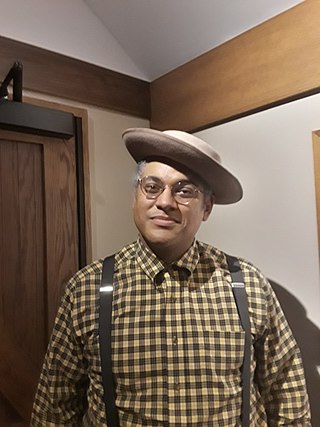
Henry St. Claire Fredericks Jr., better known by his stage name Taj Mahal, is an American blues musician and actor. He plays the guitar, piano, banjo, harmonica, and many other instruments, often incorporating elements of world music into his work. Mahal has done much to reshape the definition and scope of blues music over the course of his more than 50-year career by fusing it with nontraditional forms, including sounds from the Caribbean, Africa, India, Hawaii, and the South Pacific.

Etta Baker was an American Piedmont blues guitarist and singer from North Carolina.

The Carolina Chocolate Drops were an old-time string band from Durham, North Carolina. Their 2010 album, Genuine Negro Jig, won the Grammy Award for Best Traditional Folk Album at the 53rd Annual Grammy Awards, and was number 9 in fRoots magazine's top 10 albums of 2010.

Dancing the Blues is an album by American blues artist Taj Mahal, released in 1993.
Robert Lewis Jones, known as both Guitar Gabriel and Nyles Jones, was an American blues musician. Gabriel's unique style of guitar playing, which he referred to as "Toot Blues", combined Piedmont, Chicago, and Texas blues, as well as gospel, and was influenced by artists such as Blind Boy Fuller and Reverend Gary Davis. After hearing of Guitar Gabriel from the late Greensboro, North Carolina blues guitarist and pianist, James "Guitar Slim" Stephens, musician and folklorist Tim Duffy located and befriended Gabriel, who was the inspiration for the creation of the Music Maker Relief Foundation. Gabriel wore a trademark white sheepskin hat, which he acquired while traveling and performing with Medicine Shows during his late 20s.
Cootie Stark was an American Piedmont blues guitarist, singer, and songwriter. His best remembered recordings were "Metal Bottoms" and "Sandyland." Stark was known as the "King of the Piedmont Blues."
Neal Pattman was an American electric blues harmonica player, singer and songwriter. Sometimes billed as Big Daddy Pattman, he is best known for his self-penned tracks, "Prison Blues" and "Goin' Back To Georgia". In the latter, and most notable stages of his long career, Pattman worked with Cootie Stark, Taj Mahal, Dave Peabody, Jimmy Rip, Kenny Wayne Shepherd, Guitar Gabriel, and Lee Konitz.

John Dee Holeman was an American Piedmont blues guitarist, singer, and songwriter. His music includes elements of Texas blues, R&B and African-American string-band music. In his younger days he was also known for his proficiency as a buckdancer.

Leaving Eden is the fourth studio album by the Carolina Chocolate Drops.
Algia Mae Hinton was an American Piedmont blues guitarist and vocalist, based in Johnston County, North Carolina, United States.
Tony Braunagel is an American drummer, producer, and songwriter from Houston, Texas, United States, who is based in Los Angeles, California. Braunagel has played on many film scores and television shows as well as numerous albums as a musician, composer and producer. He is best known as a session drummer and/or percussionist of over 200 albums including those of Otis Rush, Eric Burdon, Johnny Nash, Coco Montoya, Lucky Peterson, as well as Grammy winning albums of Bonnie Raitt, Taj Mahal, Buddy Guy (percussion) and for performing live with dozens of music icons including Bonnie Raitt, Rickie Lee Jones, BB King, Lightnin’ Hopkins, John Lee Hooker, Robert Cray, Bette Midler, Lyle Lovett, and Taj Mahal to name just a few.
Richard Leslie Henry, better known as Big Boy Henry, was an American Piedmont blues guitarist, singer and songwriter. His most notable recording was "Mr. President", a protest against cuts in social welfare undertaken by President Ronald Reagan. It won Henry a W. C. Handy Award.
Cool John Ferguson is an American blues guitarist, singer and songwriter. He has released five albums under his own name and played on around twenty others. He is the Director of Creative Development for the Music Maker Relief Foundation, and plays his guitar "upside down".
Lightnin' Wells is an American Piedmont blues multi-instrumentalist and singer. He is a proficient musician and regularly plays various instruments in concert including the guitar, mandolin, harmonica, ukulele and banjo. At times he has performed as a one-man band. His style encompasses elements of the blues, country, gospel, old-time, bluegrass and folk. Mark Coltrain stated in Living Blues that, "You won't find a more versatile musician around – able to move deftly between country blues, old-time banjo, and novelty tunes with a single pluck. Lightnin' Wells changes the past..."
Brice Lee Gates was an American blues guitarist, singer, and songwriter. The cousin of fellow bluesman Albert Collins, Gates released three albums on the Music Maker label. Gates performed for almost sixty years, for the bulk of that time being resident in Milwaukee, Wisconsin.
Ardie Dean is an American electric blues drummer, audio engineer and record producer. In a varied career over fifty years, Dean has worked with the Giddens Sisters, Alabama Slim, Homesick James, Little Freddie King, Lee Gates, Ernie K-Doe, Bo Diddley, Gregg Allman, Sweet Betty, Guitar Gabriel, Adolphus Bell, Jerry McCain, Macavine Hayes, Beverly Watkins, Lightnin' Wells, Taj Mahal, Cootie Stark, Sam Frazier Jr., Ironing Board Sam, Captain Luke, Cool John Ferguson, and Robert Lee Coleman, among others.

Dominique Flemons is an American old-time music, Piedmont blues, and neotraditional country multi-instrumentalist, singer, and songwriter. He is a proficient player of the banjo, fife, guitar, harmonica, percussion, quills, and rhythm bones. He is known as "The American Songster" as his repertoire of music spans nearly a century of American folklore, ballads, and tunes. He has performed with Mike Seeger, Joe Thompson, Martin Simpson, Boo Hanks, Taj Mahal, Old Crow Medicine Show, Guy Davis, and The Reverend Peyton's Big Damn Band.
James Arthur "Boo" Hanks was an American Piedmont blues guitarist and singer. He was billed as the last of the Piedmont blues musicians.
Carl Rutherford was an American Piedmont blues, country blues, and Appalachian music guitarist, singer and songwriter.






